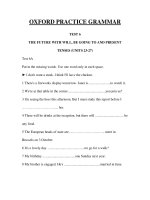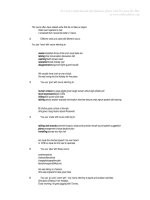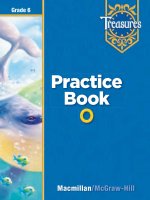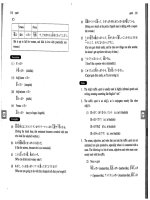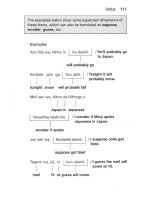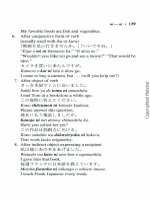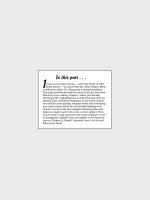Grammar grade 6
Bạn đang xem bản rút gọn của tài liệu. Xem và tải ngay bản đầy đủ của tài liệu tại đây (598.72 KB, 183 trang )
Name
Lesson
1
Date
Complete Subjects and Predicates
Teaching
A sentence is a group of words that expresses a complete thought. Every
complete sentence has two basic parts: a subject and a predicate.
The complete subject includes all the words that tell whom or what the sentence
is about.
The complete predicate includes the verb and all the words that tell what the
subject is or what the subject does.
The word planet comes from a Greek word meaning “wanderer.”
Identifying Complete Subjects and Complete Predicates
Underline the complete subject once and the complete predicate twice.
EXAMPLE Light from the sun makes life possible on Earth.
1. The sun is much bigger than all the other planets.
2. Planets in the solar system reflect light from the sun.
3. Stars twinkle in the sky at night.
4. Planets shine with a steadier light.
5. Stars such as our sun make their own light and heat.
6. Some of the planets have satellites, or moons.
7. Our planet has only one satellite.
8. The largest planet is Jupiter.
9. Asteroids, meteoroids, and comets belong to our solar system.
10. Many of the asteroids orbit in an area between Mars and Jupiter.
11. The surface of Mercury is covered with many craters.
12. Masses of clouds cover the surface of Venus.
13. Large amounts of iron in its rocks give Mars a reddish color.
Copyright © McDougal Littell Inc.
14. One of the moons of Jupiter is named Ganymede.
15. Ganymede is the biggest satellite in our solar system.
16. The rings of Saturn can be seen through a telescope.
17. The Voyager 2 mission discovered ten new moons of Uranus.
18. Voyager sent scientists new information about Neptune.
19. Many astronomers use telescopes for studying the universe.
20. Some astronomers analyze light and radio waves.
21. The Hubble Space Telescope sends scientists new information daily.
22. The planets closest to Earth are Mercury, Venus, and Mars.
GRAMMAR, USAGE, AND MECHANICS BOOK 1
CHAPTER 1
Nine planets orbit the sun.
Name
Lesson
1
Date
Complete Subjects and Predicates
More Practice
A. Identifying Complete Subjects and Predicates
EXAMPLE Stony meteors are found in outer space.
1. Meteors sometimes enter Earth’s atmosphere.
2. Friction with the air makes the meteors glow.
3. Glowing meteors are called falling stars.
4. Some fast meteors travel about 26 miles per second.
5. Large swarms of meteors enter Earth’s atmosphere several times each year.
6. The shower of sparks from the meteors appears in the sky.
7. People throughout Earth’s history have seen meteor showers.
8. A meteorite is a meteor that reaches the surface of Earth.
9. Some meteorites cause huge craters in Earth’s surface.
10. The largest meteorite now on Earth weighs about 66 tons.
B. Using Complete Subjects and Predicates
On the line to the right of each item, write how each group of words could be
used: CS for a complete subject or CP for a complete predicate. Then use each
group of words in a complete sentence, adding a complete subject or complete
predicate as needed.
CS
A high bridge crossed the river.
EXAMPLE a high bridge
1. set the table for dinner
______________
__________________________________________________________________________________________
2. a newborn kitten
______________
__________________________________________________________________________________________
3. ghost stories
______________
__________________________________________________________________________________________
4. broke the school record
______________
__________________________________________________________________________________________
5. gave her friend a gift
______________
__________________________________________________________________________________________
2 GRAMMAR, USAGE, AND MECHANICS BOOK
Copyright © McDougal Littell Inc.
CHAPTER 1
Draw a vertical line between the complete subject and the complete predicate in
each of the following sentences.
Name
Lesson
1
Date
Complete Subjects and Predicates
Application
A. Revising by Adding Details
Add details to the subjects and predicates to make more interesting sentences.
1. Planets move.
2. Stars twinkle.
__________________________________________________________________________________________
3. Spaceships travel.
__________________________________________________________________________________________
4. Astronauts train.
__________________________________________________________________________________________
5. Satellites circle.
__________________________________________________________________________________________
6. The universe expands.
__________________________________________________________________________________________
B. Writing with Complete Subjects and Complete Predicates
Imagine that you have taken these notes for a report. As you review your notes,
rewrite fragments as complete sentences. Each sentence must have a complete
subject and predicate. You may combine two or more fragments in a single sentence.
Copyright © McDougal Littell Inc.
Asteroids. Made of dark, rocky matter. Have different sizes and shapes.
Revolve around the sun. Mainly between orbits of Mars and Jupiter.
Thousands known to astronomers. Ceres the largest and discovered first,
January 1, 1801. Others—Pallas, Juno, Vesta. Sometimes collide with each
other. Pieces that fall to Earth called meteorites. New ones still being
discovered.
_____________________________________________________________________________________________
_____________________________________________________________________________________________
_____________________________________________________________________________________________
_____________________________________________________________________________________________
_____________________________________________________________________________________________
_____________________________________________________________________________________________
_____________________________________________________________________________________________
_____________________________________________________________________________________________
GRAMMAR, USAGE, AND MECHANICS BOOK 3
CHAPTER 1
__________________________________________________________________________________________
Name
Lesson
2
Date
Simple Subjects
Teaching
The simple subject is the main word or words in the complete subject. Words that
describe the subject are not part of the simple subject. In the following sentences,
the simple subjects are underlined.
COMPLETE SUBJECT
COMPLETE PREDICATE
If a proper name is used as the subject, all parts of the name make up the simple
subject.
Professor Miller at the university studies insects.
COMPLETE SUBJECT
COMPLETE PREDICATE
Identifying Simple Subjects
Underline the simple subject in each sentence.
1. Large dragonflies dart around the pond.
2. Honeybees gather nectar in the flowers.
3. The chocolate chip cookie was covered with ants.
4. Wasps often build their nests underground.
5. Monarch butterflies travel to warmer places when the weather gets too cold.
6. My brother likes to catch fireflies at night.
7. Grandmother’s woolen scarf had a moth hole in it.
8. Some large insects measure four inches in length.
9. Mosquito bites are very itchy.
10. Dr. Davis at the animal clinic treated my dog for fleas.
11. More insects live on Earth than any other living creature.
12. Beetles that live in the ground are hard to see.
13. The katydid looks like a leaf on a tree.
14. Certain insects have learned to live in hot springs or in freezing water.
15. Kindly Mrs. Danforth helped remove the stinger from my arm.
16. The silk for this blouse was produced by silkworms.
17. A green caterpillar was eating the cabbage in the garden.
18. Governor Jones surveyed the crops damaged by the grasshoppers.
19. The beekeeper gathered the honeycombs from her hives.
20. True insects have three body parts and six legs.
4 GRAMMAR, USAGE, AND MECHANICS BOOK
Copyright © McDougal Littell Inc.
CHAPTER 1
Insects all over the world are fascinating.
Name
Lesson
2
Date
Simple Subjects
More Practice
A. Identifying Simple Subjects
Underline the simple subject in each of the following sentences.
1. The dragonfly has different regional names.
mosquitoes.
3. One boy in our science class collects butterflies.
4. Gypsy moth caterpillars damaged hundreds of trees in the park.
5. Locusts travel in huge swarms from one place to another.
6. Wasp stings can be very painful.
7. Mr. Lewis at the agricultural center studies insects and their effect on crops.
8. Some insects are quite colorful.
9. Plant-loving aphids are the favorite food of ladybugs.
10. Pollen is carried from one plant to another by bees and other insects.
B. Writing Simple Subjects
Choose one of the following words to complete each sentence below. Write the
simple subject on the line. Cross out each word as you use it.
spider
ant
wings
honeybees
caterpillar
termites
moth
butterfly
eyes
centipede
1. A _______________________ spins webs and has eight legs.
2. Two huge _______________________ help the insect see.
3. _______________________ fly in and out of their hive all day.
4. A _______________________ is a long, thin insect with many pairs of legs.
Copyright © McDougal Littell Inc.
5. Two or four _______________________ carry some insects from place to place.
6. The _______________________ is the early stage in the life of a moth or butterfly.
7. Many _______________________ can damage a home or building by tunneling
through the wood.
8. The _______________________ is an insect whose larvae eat woolen fabric.
9. An _______________________ can carry objects much heavier than itself.
10. A _______________________ usually has large colorful wings.
GRAMMAR, USAGE, AND MECHANICS BOOK 5
CHAPTER 1
2. Dr. Martin at the research center studies malaria, a disease carried by
Name
Lesson
2
Date
Simple Subjects
Application
A. Writing Simple Subjects in Sentences
Use each of these words as the simple subject in a sentence.
__________________________________________________________________________________________
2. grasshopper ____________________________________________________________________
__________________________________________________________________________________________
3. tarantula________________________________________________________________________
__________________________________________________________________________________________
4. ladybug ________________________________________________________________________
__________________________________________________________________________________________
5. firefly __________________________________________________________________________
__________________________________________________________________________________________
B. Revising
Read this paragraph carefully. In some sentences, the writer has left out some of
the simple subjects. When you find a sentence without a simple subject, insert this
proofreading symbol ^ and write a simple subject in the space above it.
insects
EXAMPLE Some are helpful to us.
^
Insects can be harmful, but they benefit us too. Of course, make honey
that we use for baking and eating. Did you know that silkworms spin silk,
which we make into clothing? Many insects carry pollen to fruit and vegetable
crops. And such as oranges and apples could not produce seeds without
pollination from bees. Some such as peas, onions, and cabbages, would not
grow without the help of insects. In addition, are food for birds, fish, lizards,
and many other animals. Insects are food for certain plants too. Some good,
such as the ladybug, eat other insects that damage plants. In light of how
important insects are to other living things, should realize that insects have
a special role in the balance of nature.
6 GRAMMAR, USAGE, AND MECHANICS BOOK
Copyright © McDougal Littell Inc.
CHAPTER 1
1. bees ____________________________________________________________________________
Name
Lesson
3
Date
Simple Predicates, or Verbs
Teaching
The simple predicate, or verb is the main word or words in the complete predicate.
Children around the world love folktales. (love folktales is the complete predicate)
VERB
VERB PHRASE
Verbs are words used to express an action, a condition, or a state of being. Linking
verbs tell what the subject is. Action verbs tell what the subject does, even when
the action cannot be seen.
A folktale is an oral legend or story. (linking)
Many parents tell their children folktales. (action)
Identifying Simple Predicates, or Verbs
Underline the simple predicate, or verb, in each sentence.
1. Folktales are make-believe stories about people and animals.
2. Many English folktales start with the words, “Once upon a time.”
3. A version of the Cinderella story exists in many different countries.
4. Many folktales have a handsome prince as the hero.
5. The prince fights many battles against dragons or monsters.
6. Most tales include a beautiful princess.
7. Sometimes, a wicked witch puts the princess under a spell.
8. The courageous prince breaks the evil spell.
9. Other folktales relate stories about animals.
10. The animals act in human ways.
11. In one story, a sly fox fools a crow.
12. Another story tells of a race between a tortoise and a hare.
Copyright © McDougal Littell Inc.
13. The overconfident hare takes a nap during the race.
14. The slow-moving tortoise wins the race.
15. Often, animals play tricks in these stories.
16. The coyote is the trickster in most American Indian stories.
17. In African stories, a spider tricks other animals.
18. These stories teach lessons to their readers.
19. A story about ants and grasshoppers compares hard workers to lazy ones.
20. People of all ages enjoy folktales.
GRAMMAR, USAGE, AND MECHANICS BOOK 7
CHAPTER 1
Folktales have been told for centuries.
Name
Lesson
3
Date
Simple Predicates, or Verbs
More Practice
A. Identifying Simple Predicates, or Verbs
Underline the simple predicate, or verb, in each of the following sentences.
2. Many stories relate the adventures of Paul Bunyan.
3. Paul was a giant lumberjack from the northern part of America.
4. Babe, a blue ox, helped Paul in the forest.
5. Another legend tells about John Henry.
6. John Henry digs tunnels for the railroad.
7. One time he competes against a steam drill.
8. With only his hammer, John Henry finishes the tunnel first.
9. Pecos Bill invented all the cowboy skills in the West.
10. Once he rode a cyclone instead of his horse.
B. Writing Simple Predicates, or Verbs
Choose one of the following words to complete each sentence below. Write the
simple predicate, or verb, on the line. Cross out each verb as you use it.
tell
commands
sees
rub
ride
wishes
appears
uses
make
surprise
1. Some legends _______________________ the characters larger than life.
2. Captain Stormalong _______________________ a huge wooden ship.
3. Sailors _______________________ horses on the gigantic deck of Captain
Stormalong’s ship.
4. The crew members _______________________ soap on the sides of the ship to
squeeze through the English Channel.
5. Febold Feboldson _______________________ in stories about the Great Plains.
6. Some tales _______________________ how Feboldson planted all the
cottonwood trees.
7. Feboldson _______________________ a happy auger to dig hundreds of holes.
8. Paul Bunyan _______________________ for a giant pancake.
9. His cooks _______________________ him with a griddle as big as a skating rink.
10. Paul _______________________ his cooks skating on sticks of butter to grease
the griddle.
8 GRAMMAR, USAGE, AND MECHANICS BOOK
Copyright © McDougal Littell Inc.
CHAPTER 1
1. Legends are a popular kind of folktale.
Name
Lesson
3
Date
Simple Predicates, or Verbs
Application
A. Writing Simple Predicates, or Verbs, in Sentences
Use each of these words as the simple predicate, or verb, in a sentence.
1. find ____________________________________________________________________________
2. enjoy __________________________________________________________________________
__________________________________________________________________________________________
3. forgot __________________________________________________________________________
__________________________________________________________________________________________
4. wished ________________________________________________________________________
__________________________________________________________________________________________
5. laughed ________________________________________________________________________
__________________________________________________________________________________________
6. discovered______________________________________________________________________
__________________________________________________________________________________________
B. Revising
Copyright © McDougal Littell Inc.
Read this paragraph carefully. In some sentences, the writer has left out the simple
predicates, or verbs. When you find a sentence without a simple predicate, or verb,
insert this proofreading symbol ^ and write a verb in the space above it to complete
the sentence.
is
EXAMPLE Sir Launfal^a British knight.
The legend of King Arthur and his knights of the Round Table very old. In
the story, King Arthur of England is a brave ruler. Many knights serve him.
They in battles for the kingdom. They rescue people in need of help. One of
these knights Sir Launfal. He dreams of finding the Holy Grail. He for it for
many years. Sir Launfal never the Holy Grail. He does have many interesting
adventures, however. One day he helps a starving leper. The leper teaches Sir
Launfal the meaning of the Holy Grail. He Sir Launfal that the Grail is the
symbol of charity and mercy.
GRAMMAR, USAGE, AND MECHANICS BOOK 9
CHAPTER 1
__________________________________________________________________________________________
Name
Lesson
4
Date
Verb Phrases
Teaching
The simple predicate, or verb, may consist of two or more words. These words are
called the verb phrase. A verb phrase is made up of a main verb and one or more
helping verbs.
Many different people lived in the American colonies.
MAIN VERB
(action)
The colonists were hardworking.
MAIN VERB
(linking)
Helping verbs help the main verb express action or show time.
Ships from England would bring supplies to the settlers.
VERB PHRASE
(Would is the helping verb.)
Common Helping Verbs
Forms of be
is, am, was, are, were, be, been
Forms of do
do, does, did
Forms of have
has, have, had
Others
may, might, can, should, could, would, shall, will
Identifying Verb Phrases
Underline the verb phrase in each sentence. Include main verbs and helping verbs.
1. The colonists would build a home as quickly as possible.
2. Wood from nearby forests was used for their homes.
3. In later years, some houses were made of brick.
4. Poor settlers could make their furniture from the many trees of the forest.
5. Wealthy families could order fancy furniture from England.
6. The colonists may have brought some tools and household items with them.
7. They did eat some new foods, such as corn.
8. Most colonists would wear rough, homemade clothing called homespun.
9. Adults and children did like games and contests.
10. Sometimes, they might fly a kite.
11. Colonial children might have become good at familiar games such as marbles
and hopscotch.
12. You would have recognized some of their favorite playthings—jump ropes,
dolls, and other toys.
13. Many families would have been the proud owners of pet cats and dogs.
14. Farm children might have owned a pet lamb or pony.
15. Life in colonial times could be both difficult and fun.
10 GRAMMAR, USAGE, AND MECHANICS BOOK
Copyright © McDougal Littell Inc.
CHAPTER 1
A main verb can stand by itself as the simple predicate of a sentence.
Name
Lesson
4
Date
Verb Phrases
More Practice
A. Identifying Main Verbs and Helping Verbs
Underline the main verb once and the helping verb twice in each of the following
sentences.
1. Master craftsmen would teach young boys certain skills.
2. The young boys were called apprentices.
3. Some apprentices could learn all about fine furniture.
4. Others might be taught about the printing press.
5. An especially talented boy would be apprenticed to a lawyer or doctor.
6. Some girls were trained as housekeepers or cooks.
7. Many children did attend some type of school.
8. All should have learned daily living skills from their parents.
9. A farm boy would help his father with the chores.
10. A girl’s mother would show her daughter how to spin and weave.
B. Writing Verb Phrases
Add a helping verb to complete the verb phrase in each sentence below.
1. Some families ________________ visit colonial towns such as Williamsburg,
Virginia.
2. ________________ you toured the Governor’s Palace there?
3. A visitor ________________ see how people in the colonies actually lived.
4. You ________________ watch craftsmen making beautiful glass bowls.
Copyright © McDougal Littell Inc.
5. Criminals ________________ placed in stocks in front of the jail.
6. ________________ you ever see pictures of someone with his head and hands
locked in the wooden stock?
7. ________________ you remember the uniformed soldiers parading around
the town?
8. All the shops ________________ filled with items from colonial times.
9. You ________________ buy a tin whistle or a three-cornered hat.
10. The restaurants ________________ filled with people enjoying delicious colonial
foods.
11. ________________ you ever eaten your dinner by candlelight?
12. ________________ you think you would like to visit Williamsburg?
GRAMMAR, USAGE, AND MECHANICS BOOK 11
CHAPTER 1
EXAMPLE I am learning about life in colonial America.
Name
Lesson
4
Date
Verb Phrases
Application
A. Writing Sentences Using Verb Phrases
EXAMPLE made
Eric has made six baskets in a row.
1. play
__________________________________________________________________________________________
2. read
__________________________________________________________________________________________
3. seen
__________________________________________________________________________________________
4. run
__________________________________________________________________________________________
5. remember
__________________________________________________________________________________________
6. take
__________________________________________________________________________________________
B. Writing Using Verb Phrases
Use at least three of the following verb phrases in a story. Write the story on the
lines below and underline the verb phrases that you have used.
have discovered
would promise
could make
did invent
might choose
will try
were making
can break
_____________________________________________________________________________________________
_____________________________________________________________________________________________
_____________________________________________________________________________________________
_____________________________________________________________________________________________
_____________________________________________________________________________________________
_____________________________________________________________________________________________
_____________________________________________________________________________________________
_____________________________________________________________________________________________
_____________________________________________________________________________________________
12 GRAMMAR, USAGE, AND MECHANICS BOOK
Copyright © McDougal Littell Inc.
CHAPTER 1
Make a verb phrase by adding a helping verb to each main verb below. Then write
a sentence using the verb phrase. Underline the verb phrase.
Name
Lesson
5
Date
Compound Sentence Parts
Teaching
A compound subject is made up of two or more subjects that share the same verb.
The subjects are joined by a conjunction, or connecting word, such as and, or, or but.
Coats and jackets are on sale at the mall.
CHAPTER 1
COMPOUND SUBJECT VERB
A compound verb is made up of two or more verbs that share the same subject.
The verbs are joined by a conjunction such as and, or, or but.
A salesclerk sorted and folded the stack of sweaters.
SUBJECT
COMPOUND VERB
Identifying Compound Sentence Parts
In each sentence, underline the words in the compound subject or the compound
verb. On the line to the right, write CS for compound subject or CV for compound
verb.
Copyright © McDougal Littell Inc.
EXAMPLE Shoppers and store clerks were busy.
CS
1. Beth and her mom went holiday shopping at the mall.
________
2. Every parking space and aisle was filled with cars.
________
3. In the parking lot, they circled and waited for a long time.
________
4. Holiday decorations shimmered and sparkled all over the mall.
________
5. Shoppers strolled or hurried quickly from store to store.
________
6. Men and women carried huge packages in their arms.
________
7. Toys and games were stacked on large shelves.
________
8. Electronic equipment beeped and squeaked on the shelves.
________
9. Many weary shoppers paused and ate at the food court.
________
10. Knitted hats and scarves were arranged in a colorful display.
________
11. Little children clapped and shouted at the holiday puppet show.
________
12. Diamond rings and bracelets glittered in the jewelry store window.
________
13. Lindsey tried but failed in her search for a particular CD.
________
14. At the record shop, musicians played and sang popular holiday melodies.
________
15. Bill and Tom bought their in-line skates at the sporting goods store.
________
16. Books or puzzles make thoughtful holiday gifts.
________
17. A large crowd stood and watched the magic show.
________
GRAMMAR, USAGE, AND MECHANICS BOOK 13
Name
Lesson
5
Date
Compound Sentence Parts
More Practice
A. Identifying Compound Subjects and Compound Verbs
EXAMPLE Shoppers and browsers pick and choose from the sale table.
1. My aunt studies and compares prices from many stores.
2. Teens and families eat in the food court.
3. A valuable vase slipped and fell off the counter.
4. Many shoppers stopped and looked at the new computers.
5. Antique cars and trucks are on display in the center of the mall.
6. That store buys or trades old comic books.
7. The owners or the managers repaired or repainted several shops.
B. Using Compound Subjects and Compound Verbs
Combine the sentence pairs to form a new sentence with the sentence part in
parentheses. Use the conjunction—and, or, or but—that makes the most sense.
EXAMPLE Board games were on sale. Computer software was on sale too.
(compound subject)
Board games and computer software were on sale.
1. Susan went to the store for tennis shoes. Wendy also went to the store for
tennis shoes. (compound subject)
__________________________________________________________________________________________
2. We saw several kinds of candy at the Sweet Shop. We sampled them too.
(compound verb)
__________________________________________________________________________________________
3. At the mall ice rink, people skated to the music. People twirled around and
around. (compound verb)
__________________________________________________________________________________________
4. Wool sweaters were hanging on a rack. Knit vests were on the same rack.
(compound subject)
__________________________________________________________________________________________
5. At the bookstore, the bestsellers were on display. Other holiday books were on
display as well. (compound subject)
__________________________________________________________________________________________
14 GRAMMAR, USAGE, AND MECHANICS BOOK
Copyright © McDougal Littell Inc.
CHAPTER 1
Each of the following sentences has a compound subject, a compound verb, or
both. Underline the compound subjects once and the compound verbs twice.
Name
Lesson
5
Date
Compound Sentence Parts
Application
A. Sentence Combining with Compound Subjects and
Compound Verbs
__________________________________________________________________________________________
2. counted and recounted
__________________________________________________________________________________________
3. opened and closed
__________________________________________________________________________________________
4. clerks and managers
__________________________________________________________________________________________
5. boots and shoes
__________________________________________________________________________________________
B. More Sentence Combining
Revise the following paragraph, using compound subjects and compound verbs to
combine sentences with similar ideas. Write the new paragraph on the lines below.
Shopping at a giant computer store is an adventure. Computers in long
rows cover the display area. Monitors in long rows are there too. Software
programs fill many shelves. Computer manuals also fill the shelves. Customers
study all the computers. They try all the computers. Finally, customers find
a computer they like. They buy that computer. Many different printers are
displayed in the store. Different speakers are displayed as well. Some customers
compare these items. They choose the printer and speaker they like best.
Copyright © McDougal Littell Inc.
_____________________________________________________________________________________________
_____________________________________________________________________________________________
_____________________________________________________________________________________________
_____________________________________________________________________________________________
_____________________________________________________________________________________________
_____________________________________________________________________________________________
_____________________________________________________________________________________________
_____________________________________________________________________________________________
_____________________________________________________________________________________________
GRAMMAR, USAGE, AND MECHANICS BOOK 15
CHAPTER 1
Write sentences using these compound subjects and compound verbs.
1. cash and credit
Name
Lesson
6
Date
Kinds of Sentences
Teaching
A declarative sentence expresses a statement. It ends with a period.
The Saint Bernard has a thick brown and white coat.
Is that beautiful collie your pet?
An imperative sentence tells or asks someone to do something. It usually ends
with a period but may end with an exclamation point.
Please feed the dog his supper.
An exclamatory sentence shows strong feeling. It always ends with an
exclamation point.
What a huge dog that is!
Identifying Kinds of Sentences
On the line, identify each sentence below by writing D for declarative, INT for
interrogative, IMP for imperative, or E for exclamatory. Add the proper punctuation
mark at the end of each sentence.
1. Give the dog a bath today
________
2. How many kinds of dogs can you name in one minute
________
3. The Chihuahua is originally from Mexico
________
4. What a cute puppy you have
________
5. How does a bloodhound’s sense of smell help it find missing persons
________
6. Don’t let go of the Great Dane’s leash
________
7. Fetch the stick, Spot
________
8. The Irish setter has long, reddish-colored hair
________
9. Teams of huskies pull sleds over the ice and snow in Alaska
________
10. Do you know how many dogs are needed for each team
________
11. Take your dog for a walk every day
________
12. That dog tried to bite me
________
13. German shepherds make good watchdogs
________
14. Can you train your dog to roll over or sit
________
15. Please give that bone to the dog
________
16 GRAMMAR, USAGE, AND MECHANICS BOOK
Copyright © McDougal Littell Inc.
CHAPTER 1
An interrogative sentence asks a question. It ends with a question mark.
Name
Lesson
6
Date
Kinds of Sentences
More Practice
Using Different Kinds of Sentences
EXAMPLE Your dog is playful.
(Change to an interrogative sentence.)
Is your dog playful?
1. Is that dog a good swimmer
(Change to a declarative sentence.)
__________________________________________________________________________________________
2. Sheepdogs can round up a herd of sheep
(Change to an interrogative sentence.)
__________________________________________________________________________________________
3. The Airedale terrier is a large dog
(Change to an interrogative sentence.)
__________________________________________________________________________________________
4. Does your dog do amazing tricks
(Change to an exclamatory sentence.)
__________________________________________________________________________________________
5. How gentle that dog is with little children
(Change to a declarative sentence.)
__________________________________________________________________________________________
6. Will you call your dog back home now
Copyright © McDougal Littell Inc.
(Change to an imperative sentence.)
__________________________________________________________________________________________
7. What a good friend a dog can be
(Change to a declarative sentence.)
__________________________________________________________________________________________
GRAMMAR, USAGE, AND MECHANICS BOOK 17
CHAPTER 1
Add the correct end punctuation to each of these sentences. Then rewrite the
sentences according to the instructions in parentheses. You may have to add or
delete words and change word order.
Name
Lesson
6
Kinds of Sentences
Date
Application
Write at least four sentences you might say if you found a dog roaming around
the halls and rooms of your school. Write at least one of each kind of sentence:
declarative, interrogative, imperative, and exclamatory. Use the correct punctuation
at the end of each sentence.
_____________________________________________________________________________________________
_____________________________________________________________________________________________
_____________________________________________________________________________________________
_____________________________________________________________________________________________
_____________________________________________________________________________________________
_____________________________________________________________________________________________
_____________________________________________________________________________________________
_____________________________________________________________________________________________
_____________________________________________________________________________________________
B. Writing Different Kinds of Sentences in a Diary
Imagine that you have just come back from the first meeting of an obedience class
with your dog. What might have happened there? How do you feel about your dog
now? Write a diary entry for this day. Use at least one of each kind of sentence:
declarative, interrogative, imperative, and exclamatory. Use the correct punctuation
at the end of each sentence.
_____________________________________________________________________________________________
_____________________________________________________________________________________________
_____________________________________________________________________________________________
_____________________________________________________________________________________________
_____________________________________________________________________________________________
_____________________________________________________________________________________________
_____________________________________________________________________________________________
_____________________________________________________________________________________________
_____________________________________________________________________________________________
18 GRAMMAR, USAGE, AND MECHANICS BOOK
Copyright © McDougal Littell Inc.
CHAPTER 1
A. Writing Different Kinds of Sentences
Name
Lesson
7
Date
Subjects in Unusual Order
Reteaching
In most sentences, the subject comes before the verb. In some sentences,
however, subjects may come after the verb, come in between the verb phrase,
or not appear at all.
Are you excited?
CHAPTER 1
In most questions, the subject comes after the verb or between parts of the
verb phrase.
Have you been to the city? (Have been is the
VERB SUBJECT
SUBJECT
verb phrase)
The subject of a command, or imperative sentence, is usually you. Often, you
doesn’t appear in the sentence because it is understood.
Study the map carefully.
VERB
(The implied subject is You.)
In an inverted sentence, the subject comes after the verb.
Into the car climbed the eager family.
VERB
SUBJECT
In some sentences beginning with the words here or there, the subject follows the
verb. To find the subject, look for the verb and ask who or what.
Here is the road to the city. (What is here?)
There are the hotels listed in the book. (What are there?)
Finding Subjects and Verbs in Unusual Positions
Copyright © McDougal Littell Inc.
In the following sentences, underline the simple subject once and the verb or verb
phrase twice. If the subject is understood, write You in parentheses on the line.
1. There are many museums in the city.
______________
2. Will we visit any of them?
______________
3. Here is the new science museum.
______________
4. Is the planetarium show at one o’clock?
______________
5. Look at the schedule for the time.
______________
6. Around the corner came a huge robot.
______________
7. Was Mom surprised?
______________
8. There were many visitors at the laser show.
______________
9. Are you searching for the gift shop?
______________
10. Here is an exhibit on space travel.
______________
11. Near the satellite model was a large picture of Jupiter.
______________
12. Take a picture of Dad in the space suit.
______________
13. How much do you remember from that display?
______________
For use with Pupil’s Edition pp. 18–20
GRAMMAR, USAGE, AND MECHANICS WORKBOOK
19
Name
Lesson
7
Date
Subjects in Unusual Order
More Practice
A. Writing Sentences
EXAMPLE Over the high fence stretched the tall giraffe.
The tall giraffe stretched over the high fence.
1. Was the city zoo an interesting place?
__________________________________________________________________________________________
2. In the bird enclosure swooped a bald eagle.
__________________________________________________________________________________________
3. Near the monkey exhibit stood a large group of school children.
__________________________________________________________________________________________
4. Were the crocodiles in the small lake?
__________________________________________________________________________________________
5. On a tree branch sat a colorful parrot.
__________________________________________________________________________________________
B. Writing Sentences
Rewrite each sentence as an inverted or imperative sentence. You may choose to
add Here or There. If you write an imperative sentence, write (You) after it. Then
underline each subject once and each verb twice in your new sentence.
EXAMPLE The subway traveled around the city.
Around the city traveled the subway.
1. You can pay your fare at the subway entrance.
__________________________________________________________________________________________
2. Tall buildings reached into the blue sky.
__________________________________________________________________________________________
3. The art museum is at the end of the bus line.
__________________________________________________________________________________________
4. You must see the monument in front of City Hall.
__________________________________________________________________________________________
5. Many restaurants are near our hotel.
__________________________________________________________________________________________
20 GRAMMAR, USAGE, AND MECHANICS WORKBOOK
For use with Pupil’s Edition pp. 18–20
Copyright © McDougal Littell Inc.
CHAPTER 1
In the following sentences, underline the simple subject once and the verb twice.
Then rewrite each sentence so that the subject comes before the verb.
Name
Lesson
7
Date
Subjects in Unusual Order
Application
A. Revising Using Different Sentence Orders
CHAPTER 1
The writer of this paragraph decided never to use the usual word order of subject
before verb. In all of the paragraph’s sentences, the subject is found in an unusual
position or is understood. Rewrite the paragraph. Use a variety of sentence orders
to improve the paragraph.
Was our family trip to the city exciting? To many museums traveled our
happy group. All over the science museum were unusual exhibits. In the
planetarium was an interesting show about the stars. At the art museum were
beautiful pictures. Through the zoo walked our family. Around the city by
subway and bus traveled our family. Did we enjoy eating in the different
restaurants around our hotel? Would we like to visit the city again someday?
_____________________________________________________________________________________________
_____________________________________________________________________________________________
_____________________________________________________________________________________________
_____________________________________________________________________________________________
_____________________________________________________________________________________________
_____________________________________________________________________________________________
B. Revising Using a Variety of Sentence Orders
Copyright © McDougal Littell Inc.
The writer of this paragraph decided always to use the usual word order of subject
before verb. Rewrite the paragraph, this time using many kinds of sentence orders.
Write at least two sentences in which the subject comes before the verb. Write at
least two sentences in a more unusual order, with the subject after the verb.
Many parents and children spend time together on vacation. Some families
travel to the seashore. Other families go to the mountains. A few families sail
among tropical islands on large cruise ships. Some families go to exciting
amusement parks. Parents and children may visit historical sites far away from
home. Other families stay in their own town. They might explore nearby
museums or zoos. The best vacation of all is just being together as a family.
_____________________________________________________________________________________________
_____________________________________________________________________________________________
_____________________________________________________________________________________________
_____________________________________________________________________________________________
_____________________________________________________________________________________________
_____________________________________________________________________________________________
For use with Pupil’s Edition pp. 18–20
GRAMMAR, USAGE, AND MECHANICS WORKBOOK
21
Name
Lesson
8
Date
Complements: Subject Complements
Teaching
A subject complement is a word or group of words that follows a linking verb and
renames or describes the subject. Common linking verbs include forms of be,
such as am, is, are, was, being, been, and were; and verbs such as appear, feel,
look, sound, seem, and taste.
Both nouns and adjectives can serve as subject complements.
A predicate noun follows a linking verb and defines or renames the subject.
The painting is a still life.
SUBJECT
PREDICATE
NOUN
A predicate adjective follows a linking verb and describes a quality of the subject.
This painting of a forest is unusually beautiful.
SUBJECT
PREDICATE
ADJECTIVE
Identifying Linking Verbs and Subject Complements
In the following sentences, underline the linking verbs once and the subject
complements twice. On the line, write PA for predicate adjective or PN for
predicate noun.
1. Painting is one of the oldest arts.
______________
2. People are a favorite subject of painters.
______________
3. The subjects in early paintings were usually very important people.
______________
4. Many old paintings were religious.
______________
5. Other subjects were historical or mythical figures.
______________
6. Later, common people became the subjects of paintings.
______________
7. Sometimes, the people in paintings look very realistic.
______________
8. Other paintings are imaginative.
______________
9. The people and scenery seem dreamlike.
______________
10. Another popular subject is nature.
______________
11. Landscapes and seascapes are paintings of our natural world.
______________
12. Still lifes are pictures of objects.
______________
13. These subjects look quite detailed.
______________
14. Some paintings become huge, covering whole walls.
______________
15. Other paintings are tiny.
______________
22 GRAMMAR, USAGE, AND MECHANICS BOOK
Copyright © McDougal Littell Inc.
CHAPTER 1
A complement is a word or group of words that completes the meaning of the verb.
Name
Lesson
8
Date
Complements: Subject Complements
More Practice
A. Identifying Types of Subject Complements
EXAMPLE The lives of many artists were interesting.
PA
1. Michelangelo was an artistic genius.
__________
2. His styles of art were quite different.
__________
3. Michelangelo became a sculptor.
__________
4. His large, marble statues appear lifelike.
__________
5. Many of his statues feel incredibly smooth.
__________
6. Michelangelo became famous for his paintings.
__________
7. His paintings in the Sistine Chapel look magnificent.
__________
8. His career as an architect was challenging.
__________
9. The dome of St. Peter’s Church was his plan.
__________
__________
10. In his later years, Michelangelo became a poet.
B. Using Subject Complements
Complete each sentence below. First complete it with a predicate noun. Then
complete it with a predicate adjective.
my uncle.
The artist is talented.
Copyright © McDougal Littell Inc.
EXAMPLE The artist is
1. The painting is _______________________.
The painting is _______________________.
2. The colors are _______________________.
The colors are _______________________.
3. The dog in the painting is _______________________.
The dog in the painting is _______________________.
4. The painting’s setting is _______________________.
The painting’s setting is _______________________.
GRAMMAR, USAGE, AND MECHANICS BOOK 23
CHAPTER 1
In each of the following sentences, underline the linking verb once and the subject
complement twice. Then, on the line, write PN if the subject complement is a
predicate noun or PA if it is a predicate adjective.
Name
Lesson
8
Complements: Subject Complements
Date
Application
A. Writing Subject Complements
(1) My favorite form of art is sculpture. (2) The work of art that I wish I
owned is a statue of a young dancer. (3) It looks beautiful. (4) When I look at
that artwork, I feel happy. (5) It is truly a masterpiece. (6) The life of an artist
must be very satisfying.
1. ________________________________________________________________________________
2. ________________________________________________________________________________
3. ________________________________________________________________________________
4. ________________________________________________________________________________
5. ________________________________________________________________________________
6. ________________________________________________________________________________
B. Writing with Subject Complements
Imagine that you have just visited a museum where you saw some unusual works of
art. Write six sentences about your museum visit and what you saw there. Three of
the sentences should have predicate adjectives. Three should have predicate nouns.
1. ________________________________________________________________________________
__________________________________________________________________________________________
2. ________________________________________________________________________________
__________________________________________________________________________________________
3. ________________________________________________________________________________
__________________________________________________________________________________________
4. ________________________________________________________________________________
__________________________________________________________________________________________
5. ________________________________________________________________________________
__________________________________________________________________________________________
6. ________________________________________________________________________________
__________________________________________________________________________________________
24 GRAMMAR, USAGE, AND MECHANICS BOOK
Copyright © McDougal Littell Inc.
CHAPTER 1
Rewrite each of the numbered sentences in the passage below with a new subject
complement. Underline your new subject complement. If it is a predicate noun,
write PN in parentheses after the sentence. If it is a predicate adjective, write PA.
Name
Lesson
9
Date
Complements: Objects of Verbs
Teaching
Action verbs often need complements called direct objects and indirect objects to
complete their meaning.
Dad read the comics. (What did Dad read?)
An indirect object is a word or group of words that tells to what or to whom, or for
whom or for what an action is done. The indirect object usually comes between
the verb and the direct object. Verbs that are often followed by an indirect object
include ask, bring, give, hand, lend, make, offer, send, show, teach, tell, and write.
Dad read his daughter the comics. (To whom did Dad read the comics?)
Recognizing Objects of Verbs
In each sentence, if the underlined word is a direct object, write DO on the line. If it
is an indirect object, write IO.
Copyright © McDougal Littell Inc.
EXAMPLE The diver found a shipwreck.
DO
1. The detective finally solved the mystery.
______________
2. The campers cooked their food over an open fire.
______________
3. The loud music gave me a headache.
______________
4. The rabbit in Alice in Wonderland carries a watch.
______________
5. Andrea showed my family the photographs from her trip.
______________
6. We offered Jim a ride to the game.
______________
7. The electric eel stuns its enemies with an electric shock.
______________
8. Remember to send your hostess a thank-you note.
______________
9. Mr. Weld baked his daughter a birthday cake.
______________
10. The monkeys climbed the tall trees in the rain forest.
______________
11. Candice told her sister a secret.
______________
12. You can rent videos at that store.
______________
13. The Bureau of the Mint manufactures all coins in the United States.
______________
14. Enrique taught his dog a new trick.
______________
15. Imagine a city under the sea.
______________
GRAMMAR, USAGE, AND MECHANICS BOOK 25
CHAPTER 1
A direct object is a word or a group of words that names the receiver of the action
of an action verb. It answers the question what or whom.
